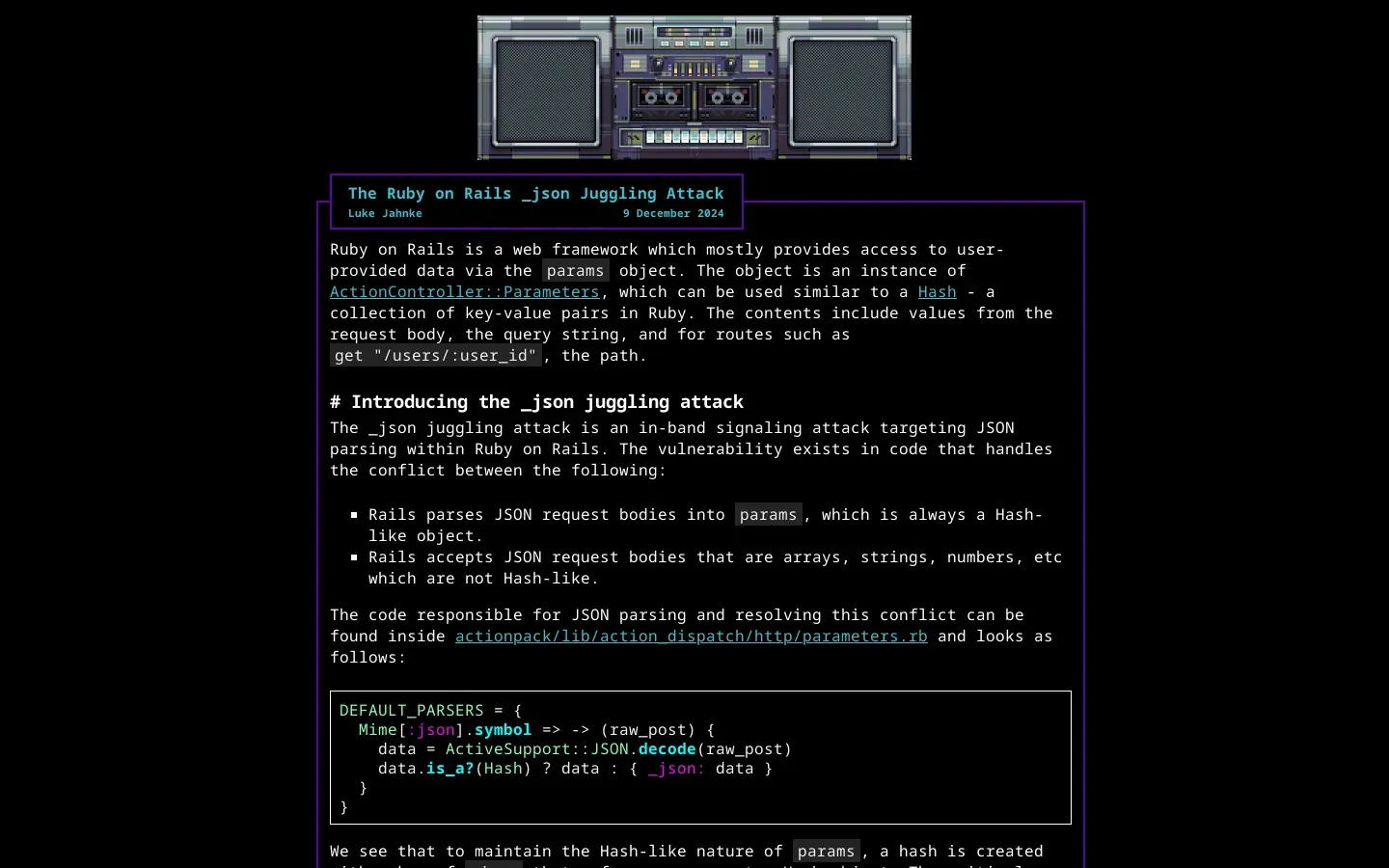
Ruby on Rails Vulnerability Linked to JSON Juggling Attacks
/ 4 min read
Quick take - recent research has revealed a significant vulnerability in the Ruby on Rails framework related to _json juggling attacks, highlighting the need for improved input validation, security testing, and awareness of potential exploitation risks in web applications.
Fast Facts
- A significant vulnerability related to _json juggling attacks has been identified in the Ruby on Rails framework, highlighting weaknesses in input validation and sanitization.
- Researchers demonstrated the exploitability of these vulnerabilities through a proof-of-concept in a controlled testing environment.
- The study emphasizes the need for improved input validation, awareness of in-band signaling attacks, and rigorous security testing practices in Ruby on Rails applications.
- Recommendations include developing framework-specific security guidelines and enhancing security frameworks for JSON parsing.
- Future implications call for automated penetration testing tools, training programs for developers, and ongoing research into vulnerabilities across various web development frameworks.
Research Uncovers Vulnerability in Ruby on Rails Related to JSON Juggling Attacks
Recent research has unveiled a significant vulnerability within the Ruby on Rails framework, specifically linked to JSON juggling attacks. This discovery has sent ripples through the cybersecurity community, highlighting critical weaknesses in input validation and sanitization processes. The implications of these vulnerabilities are profound, potentially affecting numerous web applications that rely on Ruby on Rails.
Methodology of the Study
The research was conducted using a structured approach that meticulously identified and demonstrated the potential exploitation of these vulnerabilities. Initially, researchers pinpointed specific weaknesses within the Ruby on Rails framework susceptible to JSON juggling attacks. A proof-of-concept was then developed, effectively illustrating how these vulnerabilities could be exploited in real-world scenarios.
To ensure accuracy, the team established a controlled testing environment replicating common use cases of Ruby on Rails applications. This setup allowed for a comprehensive examination of the vulnerabilities’ impact. Following this, a detailed security analysis was conducted, resulting in practical recommendations aimed at mitigating associated risks.
Key Findings
The study’s findings underscore several critical areas for improvement in cybersecurity practices:
-
Enhanced Input Validation and Sanitization: The research highlights an urgent need for improved mechanisms within Ruby on Rails applications to prevent exploitation.
-
Awareness of In-band Signaling Attacks: Developers must become more aware of in-band signaling attacks, which exploit existing communication channels to bypass traditional security measures.
-
Security Testing and Code Review Practices: Rigorous security testing and thorough code reviews are essential to identify and address vulnerabilities before deployment.
-
Framework-Specific Security Guidelines: The development of security guidelines tailored to specific frameworks is recommended to aid developers in securing their applications against such vulnerabilities.
Strengths and Limitations
The research is commendable for its rigorous methodology and practical implications, offering a clear framework for understanding and addressing identified vulnerabilities. However, it does have limitations, primarily its narrow focus on the Ruby on Rails framework. This focus may overlook similar vulnerabilities present in other frameworks, indicating a need for broader investigations across different platforms and programming languages.
Tools and Techniques Discussed
The study delved into various tools and techniques relevant to JSON juggling attacks:
-
Ruby on Rails Framework: The primary focus due to its widespread use in web application development.
-
ActionController::Parameters: Identified as susceptible to manipulation within Rails applications.
-
HashWithIndifferentAccess: A feature allowing access to keys using either symbols or strings, which can be exploited if not properly managed.
-
Docker: Suggested as a tool for creating isolated testing environments to evaluate vulnerabilities without impacting live systems.
Implications for the Future
The implications of this research extend beyond Ruby on Rails, calling for several proactive measures:
-
Enhanced Security Frameworks for JSON Parsing: Developing robust security frameworks to handle JSON parsing safely in web applications is crucial.
-
Automated Penetration Testing Tools: There is a need for automated tools that facilitate penetration testing and efficiently identify vulnerabilities.
-
Training and Awareness Programs: Implementing training programs to educate developers about secure coding practices and potential vulnerabilities is essential.
-
Research on Related Vulnerabilities: Continued research efforts should focus on identifying and addressing vulnerabilities across various web development frameworks to ensure comprehensive cybersecurity measures.
As the cybersecurity landscape continues to evolve, staying informed about such vulnerabilities and adopting recommended practices will be vital for developers and organizations alike.



